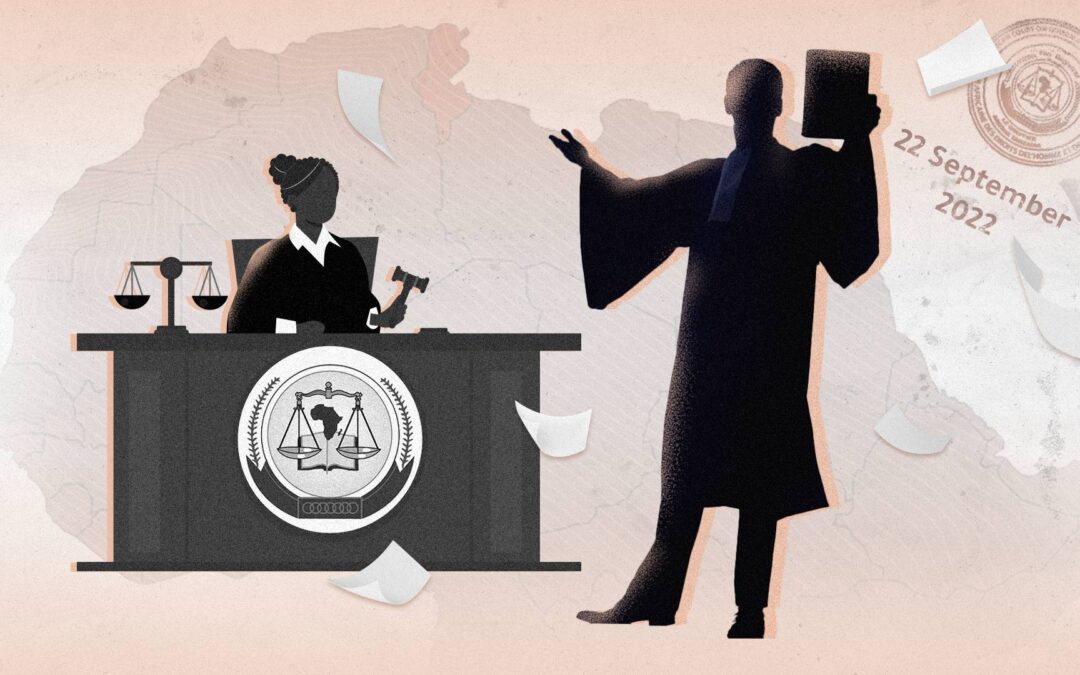
Nov 6, 2023 | News
Today, the African Court of Human and Peoples’ Rights (AfCHPR) opens its 71st Ordinary Session. To mark the occasion, the International Commission of Jurists (ICJ), in collaboration with inkyfada, looks back at AfCHPR’s September 2022 judgement against Tunisia, in which it ordered the republic to return to constitutional democracy and establish an independent constitutional court. The ICJ examines the impact of the judgement on human rights in Tunisia, and how individuals can operationalize the AfCHPR to challenge the curtailment of fundamental freedoms, judicial independence and rule of law in Tunisia.
ICJ’s questions and answers:
It has been more than a year since the African Court on Human and People’s rights issued its judgment in case No. 017/2021, “Ibrahim Ben Mohamed Ben Brahim Belguith v. Republic of Tunisia”, of 22 September 2022. The case was brought by Mr. Belguith, a national of Tunisia and a lawyer, who complained of violations of his rights under the African Charter on Human and Peoples’ Rights and other human rights instruments as a result of the promulgation of several Tunisian presidential decrees adopted under the “state of exception” pursuant to article 80 of the 2014 Constitution since 25 July 2021. In this judgment, the African Court ordered Tunisia to repeal these decrees, to return to constitutional democracy within two years and to ensure the establishment and operation of an independent constitutional court within the same period.
What does this judgment mean and why is it important for the rule of law and human rights in Tunisia? The ICJ provides answers in the Q&A below:
-
- What is the African Court on Human and Peoples’ Rights?
* The African Union
* The African Charter on Human and Peoples’ Rights
* The African Commission on Human and Peoples’ Rights
* The African Court on Human and Peoples’ Rights
* Tunisia’s adherence to the African Human Rights System
-
- Why was the African Court seized of the situation in Tunisia? Contextual overview
* President Kais Saied’s power grab of 25 July 2021
* The absence of a Constitutional Court
-
- What did the 22 September 2022 judgment rule?
* How the African Court came to rule on the matter: the application
* What the judgment ruled:
-
- What are the next steps?
* Implementation
* Other complaints against Tunisia pending before the African Court
Download the full Q&A in English here
Download the full Q&A in French here
Download the full Q&A in Arabic here
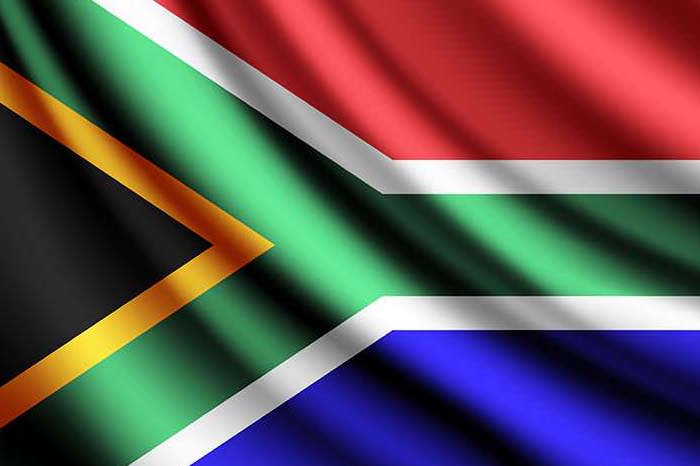
Nov 1, 2023 | News
The International Commission of Jurists (ICJ) made a submission to the UN Committee on the Elimination of Racial Discrimination in view of the Committee’s examination of the Combined Ninth to Eleventh Periodic Reports of South Africa under Article 9 of the International Convention on the Elimination of All Forms of Racial Discrimination (ICERD). The submission focussed primarily on the treatment of non-citizens with reference to the 2019 National Action Plan and on South Africa’s violations of the right to access health care and treatment, the right to work, as well as on concerns around residence and humanitarian protection for Zimbabweans.
The following are among some of the recommendations featured in the submission, which ICJ addressed to the South African government, to tackle a number of violations of the ICERD:
- Enact legislation that permits trained attorneys who are non-citizen/non-permanent residents to be admitted into the South African legal profession. Remove unequal practices and policies that discriminate against non-citizens and deny or undermine their ability to work in their chosen profession. Promote and advance the rights to work, to free choice of employment, to just and favorable conditions of work, to protection against unemployment, to equal pay for equal work, to just and favorable remuneration;
- Acknowledge that, based on the demographics of South Africa’s migration trends, discrimination based on national origin and citizenship status carries a quality of xenophobia and racial discrimination and should be recognized as unconstitutional and a violation of South Africa’s obligations under the Convention;
- Halt the termination of the ZEP programme and institute a pathway toward permanent residency for the 178,000 Zimbabweans who have lived and worked in South Africa for over a decade under the ZEP programme; and
- Extend the ruling that found denying access to public healthcare for non-citizen mothers, lactating mothers and children under the age of six is unconstitutional so as to ensure that denial of access to public healthcare to any individual in South Africa is unconstitutional;
- Formalize the informal economy by ensuring that informal economy workers are catered for under labour, occupational health and safety, social protection and non-discrimination laws;
- Ensure that by-laws and regulations comply with the right to work and the right to non-discrimination in the South African Constitution and under the Convention.
The following organizations have endorsed this submission:
- Lawyers for Human Rights
- Section 27
- Centre for Applied Legal Studies
- Health Justice Initiative
- Kopanang Africa Against Xenophobia
- Solidarity Centre
- The Consortium for Refugees and Migrants in Southern Africa.
Download the submission
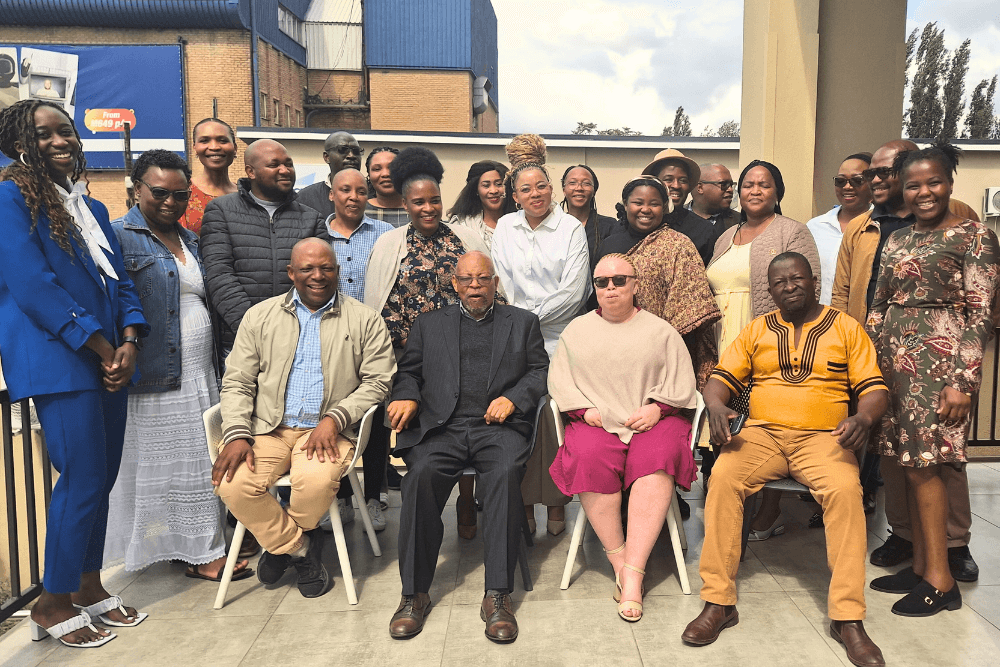
Oct 23, 2023 | News
On 11 and 12 October 2023, the International Commission of Jurists (ICJ), People’s Matrix Association and Seinoli Legal Centre (SLC) jointly held a workshop for magistrates and judges in Maseru, Lesotho’s capital. Drawing on ICJ’s 8 March Principles for a Human Rights-Based Approach to Criminal Law Proscribing Conduct Associated with Sex, Reproduction, Drug Use, HIV, Homelessness and Poverty, the workshop was aimed at enhancing the Lesotho judiciary’s ability to apply a human rights-based approach in the application and enforcement of domestic criminal law.
The central theme explored by participants throughout the workshop was the profoundly negative human rights impact of unjustified criminalization, especially for marginalized individuals and communities. At the workshop, the Acting Chief Justice of Lesotho, Tšeliso Monapathi, emphasized the importance of the judiciary as the last line of defence for ensuring the protection of human rights.
Participants at the workshop noted some positive legal developments in Lesotho that are consistent with international human rights law, including the repeal of vagrancy laws through the introduction of the 2010 Penal Code. Most recently, in October 2022, the High Court of Lesotho, sitting as a Constitutional Court, declared section 32(a)(vii) of the 2003 Sexual Offences Act unconstitutional. The Court ruled that the provision, which imposes the death penalty on HIV-infected persons who commit sexual offences, was unconstitutional to the extent that it violated the rights to equality before the law and equal protection of the law, freedom from discrimination, and freedom from inhuman treatment as guaranteed by the Lesotho Constitution. However, in June this year, in their joint submission to the UN Human Rights Committee, the ICJ, People’s Matrix and Seinoli Legal Centre noted with concern that the Sexual Offences Act left the common law offence of “sodomy” intact.
“Despite some progressive milestones in the protection and promotion of fundamental human rights and freedoms of all persons, it is deeply concerning that there remain a number of criminal laws that disproportionately impact sex workers, LGBTQI+ persons, those seeking sexual and reproductive health care services, such as abortion care, and other marginalized groups,” said Mosa Lestie, Programme Lawyer at Seinoli Legal Centre.
The participants, the majority of whom were magistrates, discussed measures the courts have employed to promote and protect the human rights of marginalized groups. This includes sensitization on the human rights of persons with disabilities, LGBTQI+ persons and other marginalized groups, particularly their right to access to justice and the implementation and continual development of court rules to ensure that all persons can participate in court proceedings on an equal basis as complainants, witnesses, accused persons or experts. For instance, in July 2023, the Lesotho National Federation hosted a training workshop with some magistrates and prosecutors on access to justice for persons with disabilities and the 2023 Disability Equity (Procedure) Rules.
Despite these efforts, participants expressed concern that limitations continue to exist in relation to: the provision of accommodations for accused and witnesses at court; worrying trends of discrimination within the wider criminal justice system, especially among the police. They also identified the need for ongoing human rights training for magistrates and other actors in the criminal justice system.
“The unjustified or arbitrary over-criminalization of conduct associated with LGBTQI+ individuals in Lesotho continues to result in discrimination and stigmatization. In turn, this has significantly impeded access to justice for the communities the People’s Matrix supports,” said Giselle Ratalane, Programme Manager at the People’s Matrix Association.
“As the ICJ’s 8 March Principles underscore, these criminal laws have discriminatory effects on marginalized groups and violate Lesotho’s obligations under international human rights law, including with respect to the rights to equality, non-discrimination, dignity, privacy, freedom of expression and more,” concluded Mulesa Lumina, ICJ Africa’s Legal and Communications Associate Officer.
Contact
Mulesa Lumina, Legal and Communications Associate Officer (Africa Regional Programme), e: mulesa.lumina@icj.org
Kaajal Ramjathan-Keogh, Director (Africa Regional Programme), e: kaajal.keogh@icj.org
Background
While Lesotho has made some strides in recognizing and safeguarding the human rights of all persons, including through the introduction of various laws and policies, certain conduct continues to be targeted by criminal laws notwithstanding the fact that under general principles of criminal law and international human rights law and standards, such conduct should not be criminalized in the first place.
As a State Party to a number of international human rights instruments, including the International Covenant on Civil and Political Rights (ICCPR), the African Charter on Human and Peoples’ Rights and the Protocol to the African Charter on Human and Peoples’ Rights on the Rights of Women in Africa, Lesotho must ensure that its criminal laws do not directly or indirectly discriminate against anyone on grounds prohibited by international human rights law.
The 8 March Principles for a Human Rights-Based Approach to Criminal Law Proscribing Conduct Associated with Sex, Reproduction, Drug Use, HIV, Homelessness and Poverty, recently published by the ICJ, offer a clear, accessible, and operational legal framework and practical legal guidance for a variety of stakeholders, including judges and magistrates, on the application of criminal law to conduct associated with consensual sexual activities, such as consensual same-sex sexual relations and sex work (Principles 16 and 17); the criminalization of sexual orientation, gender identity and gender expression (Principle 18); drug use (Principle 20); as well as homelessness and poverty (Principle 21). As stated in Principles 7 and 8, criminal law “must be interpreted consistently with international human rights law” and “…may not, on its face or as applied, in substance or in form, directly or indirectly discriminate on any, including multiple and intersecting, grounds prohibited by international human rights law”.
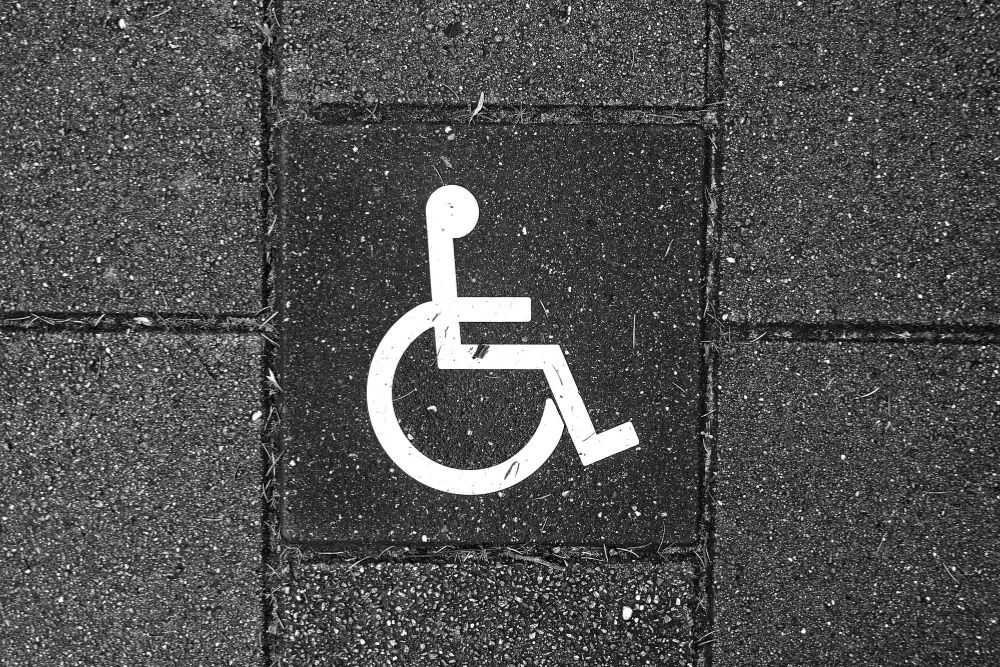
Oct 23, 2023 | News
At a workshop convened on 11 and 12 October, the International Commission of Jurists (ICJ), Validity Foundation, and the United Disabled Persons of Kenya (UDPK) stepped up efforts to promote the greater use of strategic litigation to secure the rights of persons with disabilities. The workshop was aimed particularly at building the capacity of organizations of persons with disabilities (OPDs) to undertake strategic litigation.
“As a party to the Convention on the Rights of Persons With Disabilities, the African Disability Protocol and other regional and UN human rights treaties, Kenya is obliged to ensure that all persons with disabilities enjoy all human rights on an equal basis. Kenya’s obligations include a duty to ensure that effective remedies – including throughout courts – are available where persons with disabilities allege the denial of their rights,” said Wilson Macharia, ICJ Africa’s Associate Legal Advisor.
Strategic litigation is currently underutilized by persons with disabilities and their representative organizations in Kenya. At the workshop, persons with disabilities indicated that they faced barriers to instituting or participating effectively in litigation due to:
- a general lack of knowledge of their rights and the existing mechanisms to enforce these rights;
- a lack of knowledge on the operations of the available mechanisms, including complex court procedures.
- a lack of knowledge on existing legal aid programs and services.
- a failure by courts and other justice mechanisms to provide appropriate reasonable and procedural accommodations.
CSOs and lawyers who attended the workshop stressed that key stakeholders, including those who provide litigation support to indigent persons, typically do not have adequate capacity and training to advocate for the rights of persons with disabilities.
“The Law Society of Kenya should work towards establishing a committee with a specific mandate of advocating for the rights of persons with disabilities, in addition to mainstreaming disability rights in the existing committees”, said Were Bonface, an advocate from the Public Interest and Advocacy Directorate of the Law Society of Kenya.
During the workshop, the participants also discussed the need for continuous meaningful engagement between OPDs and other key stakeholders which undertake legal advocacy on human rights, including the Kenya National Commission on Human Rights, Katiba Institute, the Law Society of Kenya, and the Federation of Women Lawyers in Kenya.
Contact:
Wilson Macharia, ICJ Africa Associate Legal Adviser, e: wilson.macharia@icj.org
Background
The workshop brought together OPDs, CSOs, the Law Society of Kenya, the Kenya National Commission on Human Rights, the Judiciary, the national Legal Aid Service and other stakeholders. The workshop served as a platform to discuss potential areas of strategic litigation on the rights of persons with disabilities in Kenya, including legal reform, inclusive education, legal capacity, denial of reasonable accommodation, and accessibility. The workshop follows on from ICJ and African Union of the Blind’s partners’ previous engagement on access to justice for persons with disabilities at a half-day workshop held in Nairobi on 8 September 2022. The ICJ has also engaged with Criminal Justice Actors from Milimani Law Courts in Nairobi, and has supported Kenyan OPDs in preparing submissions to the Committee on the Rights of Persons with Disabilities.
The Constitution of Kenya 2010 incorporates widespread human rights protections for all persons, including persons with disabilities. In particular, article 54 elaborates the rights of persons with disabilities to be treated with dignity; to have equal access to all places, spaces and facilities; and to access equipment to overcome constraints arising from disability. Article 22 of the Constitution gives every person the right to institute court proceedings claiming that a right or fundamental freedom in the Bill of Rights has been denied, violated or infringed, or is threatened. In addition, the obligations under international human rights law, including the Convention on the Rights of Persons with Disabilities and the Protocol to the African Charter on Human and Peoples’ Rights on the Rights of Persons with Disabilities form part of Kenyan law by virtue of article 2(6) of the Constitution.
Resources
The Constitution of Kenya 2010
Kenya Persons with Disabilities Act 2003
Convention on the Rights of Persons with Disabilities
Protocol to the African Charter on Human and Peoples’ Rights on the Rights of Persons with Disabilities
International Principles and Guidelines on Access to Justice for Persons with Disabilities
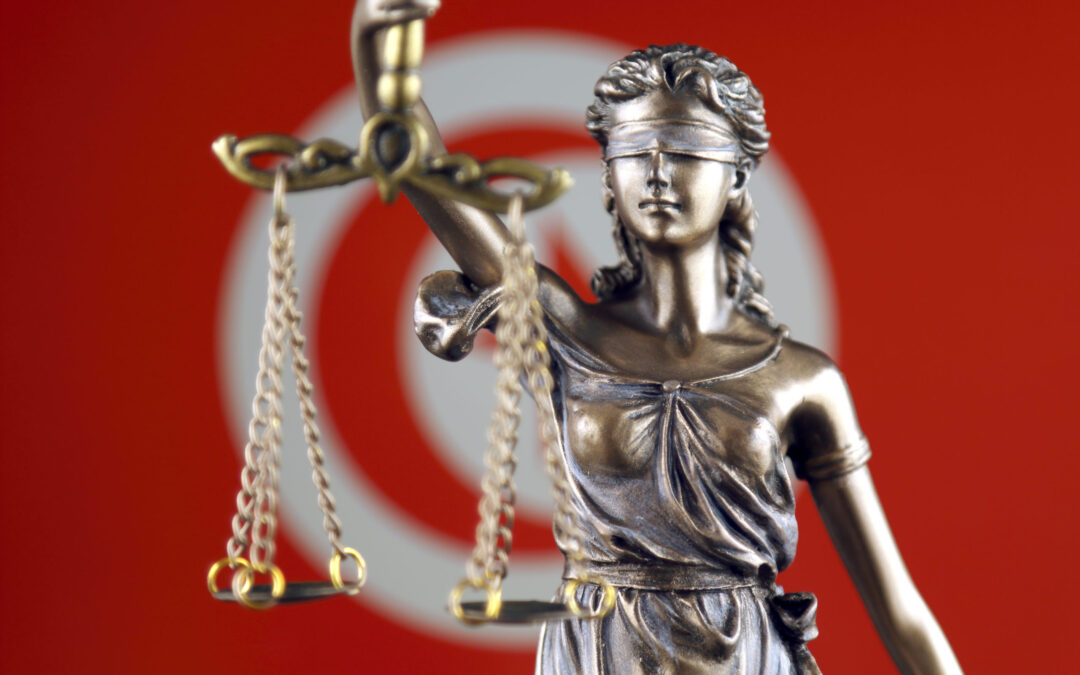
Oct 5, 2023 | News
The ICJ condemns the recent prosecution of two lawyers, Dalila Msadek and Islem Hamza, who act as defence counsel in a high-profile case involving political opposition figures. On 29 September 2023, the Public Prosecutor of the Tunis Court of First Instance initiated criminal proceedings against Dalila Msadek and Islem Hamza, who are members of the legal team defending a number of political opponents of the regime of Tunisia’s President, Kais Saied, some of whom have been detained since February 2023 for their alleged involvement in the so-called conspiracy case based on charges related to “terrorism” and “State security”.
البيان باللغة العربية على هذا الرابط
The ICJ further condemns the prosecution of Ayachi Hammami, also acting as defence counsel in the “conspiracy case”, who is scheduled to appear before the investigating judge of the “counter-terrorism” specialized judicial unit on 10 October 2023. Ayachi Hammami was informed that he was being prosecuted in the “conspiracy case” on 3 May 2023.
The prosecutions of Dalila Msadek, Islem Hamza and Ayachi Hammami are emblematic illustrations of a pattern of judicial harassment of lawyers representing individuals involved in political cases in Tunisia where the lawyers themselves are targeted solely because of their legitimate professional activities, ultimately underming their ability to defend their clients’ human rights, free from intimidation, hindrance, harassment or improper interference.
“This growing pattern of judicial harassment of lawyers solely for their legitimate discharge of their professional duties violates their human rights, including to liberty and security of person, fair trial, work and freedom of expression, as well as their clients’ right to a fair trial, including the right to defend themselves and to legal representation and assistance,” said Said Benarbia, ICJ MENA Director.
Dalila Msadek and Islem Hamza face charges of “spreading fake news with the aim of threatening public security through audio-visual media”, pursuant to article 24 of Decree-law 2022-54 of 13 September 2022, and of “processing of personal data relating to criminal offences, their investigation, criminal proceedings, penalties, preventive measures or criminal records”, pursuant to articles 13 and 87 of Organic Law No. 2004-63 on the protection of personal data. Dalila Msadek and Islem Hamza are being prosecuted in connection with statements they made on the radio on 28 and 29 September 2023 in which they mentioned having requested that the investigating judge of the ”counter-terrorism” specialized judicial unit should hear the diplomats whom their clients allegedly met as part of the “conspiracy” of which the prosecution accuses them.
Since June 2023, Islem Hamza has also been prosecuted in a separate case, under article 24 of Decree-Law 54, following a statement she made on the radio, in her capacity as a defence lawyer of arrested political opponents, denouncing the conditions of transfer of detainees as inhumane. Similarly, Ayachi Hammami has been prosecuted since January 2023 in a distinct case pursuant to Decree-Law 54 based on a statement he made in his capacity as a defence lawyer of the dismissed judges.
The ICJ considers that, to prosecute Islem Hamza, Dalila Msadek and Ayachi Hammami, the prosecution authorities have latched onto statements that Islem Hamza, Dalila Msadek and Ayachi Hammami made in the legitimate discharge of their professional duties as lawyers towards their clients. In addition, their statements constitute the protected exercise of their right to freedom of expression and, as such, cannot be subject to criminal prosecution under general principles of criminal law and international human rights law and standards.
Islem Hamza, Dalila Msadek and Ayachi Hammami are not isolated cases: Abdelaaziz Essid is also being prosecuted based on a statement he made as a defence lawyer in the “conspiracy case”. Moreover, Ghazi Chaouachi and Rhida Belhaj, who were representing other defendants in the “conspiracy case”, are being prosecuted in that very same case before the “counter-terrorism” specialized judicial unit.
“After arbitrarily detaining peaceful political opposition members, the authorities are increasingly using the criminal law to harass and intimidate defence lawyers and disrupt the legitimate discharge of their professional duties,” said Said Benarbia. “In so doing, they are sending the chilling message that any lawyers who represent defendants in political cases expose themselves to the risk of being prosecuted on spurious criminal charges.”
The ICJ calls on the Tunisian authorities to drop all criminal charges against all lawyers currently prosecuted solely for the legitimate discharge of their professional duties and the peaceful exercise of their right to freedom of expression and to immediately end all practices that hinder the work of lawyers.
Background
Since 2022, State authorities have increasingly targeted Tunisian lawyers for their legitimate defence work and for exercising their human rights. On 26 May 2023, several mandate holders of the UN Human Rights Council Special Procedures expressed concern over some of these cases.
According to information available to the ICJ, at least 27 lawyers are facing or have faced criminal prosecutions since 2022 based on charges related to, among others, “terrorism” and “State security”, or based on public statements critical of the executive. Among these, three – Noureddine Bhiri, Ghazi Chaouachi and Rhida Belhaj, who began a hunger strike on 2 October 2023 along with other detainees in the “conspiracy case” – are currently in detention; three other defence lawyers – Abdelrazak Kilani, Mehdi Zagrouba and Seifeddine Makhlouf – have been tried and imprisoned by military courts; and 15 others have been banned from traveling, including Lazhar Akermi following his release from pre-trial detention.
Lawyers, like any other person, enjoy the right to freedom of expression, as protected under human rights treaties to which Tunisia is party. These include the International Covenant on Civil and Political Rights and the African Charter on Human and Peoples’ Rights.
The UN Basic Principles on the Role of Lawyers and the African Commission on Human Peoples’ rights’ Principles and Guidelines on the Right to a Fair Trial in Africa reaffirm this principle and state that governments shall ensure that lawyers are able “to perform all of their professional functions without intimidation, hindrance, harassment or improper interference”, and “to travel and to consult with their clients freely both within their own country and abroad.”
The UN Special Rapporteur on the Independence of Judges and Lawyers has urged public prosecutors “ to closely monitor situations and cases in which lawyers might be criminalized for performing their duties. When such circumstances arise, appropriate orders should be issued to prevent public prosecutors from maliciously prosecuting members of the legal profession who criticize State officials and institutions in the exercise of their independence and freedom of expression.”








